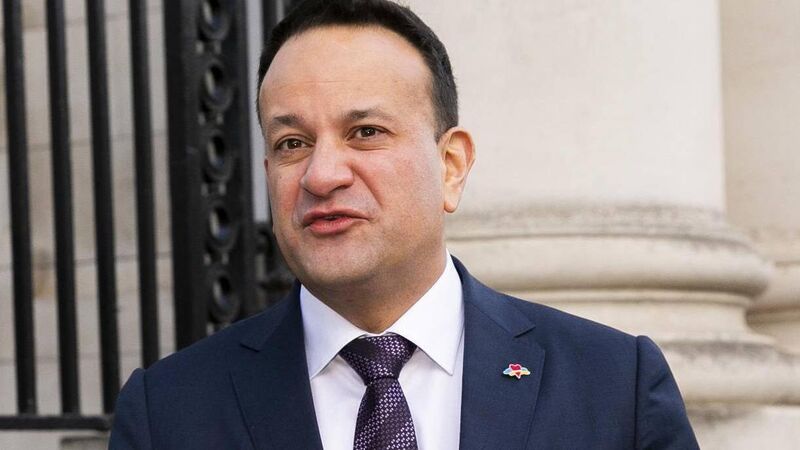We stepped up, but government has bit off more than it can chew

Taoiseach Leo Varadkar. Ailin Quinlan said it is time for the government to realise they have bitten off more than they can chew.
According to this, if you say someone has bitten off more than they can chew, you basically mean he or she is trying to do something that’s beyond their ability.
The saying dates back to 1800s America, when it was common practice to chew tobacco. It was considered good manners to offer others a bite of your tobacco block, but there was always the greedy-guts who’d take a bigger bite of it than he could chew. Hence the adage, don’t bite off more than you can chew.
Real life tends to teach this lesson to most people early on - if you bite off more than you can chew, you end up struggling. But there are, alas, those in Leinster House who do not appear to have learned this lesson. Or if they did, they forgot it as soon as they got a Dáil seat.
Because, it seems, in the parallel universe that is Leinster House, if you bite off more than you can chew, you just spit it out and let Joe Soap deal with it.
Take, for example, the government’s big-hearted decision to throw open the gates and extend its arms to fleeing Ukrainian refugees, calling on hoteliers, B&Bs and anyone with rental accommodation to come forward - even ordinary families were urged to give up their spare bedrooms and so on, to offer shelter.
In fairness, people all over the country answered the call. Some people complained about the glaring lack of any State-orchestrated helping hand of this magnitude being extended to the existing hordes of homeless people on Ireland’s streets. But, anyway.
People in all walks of life stepped up to the plate and did their best to help. Families opened their hearts, hotels opened their doors and work began on preparing many large, disused institutional buildings for the wave of incoming refugees.
The Irish State was already struggling with grossly under-resourced health, social welfare and education systems, and a crisis-ridden housing network, not to mention increasing social problems like violent crime, rape, drugs and anti-social behaviour.
This week we learned that there are no places at second level schools for some pupils next September because of the inevitable increased demand on the system.
There have been other unintended consequences of the government biting off more than it could chew.
A family member of mine who lives in Dublin came home from work one day to find a letter posted in his door by a Brazilian woman desperately seeking accommodation. Her landlord had requested her and the others in that building who rented accommodation from him to leave - because he wanted to rent their shared rooms to what she termed “unfortunate Ukrainian refugees” at €260 per week per person from the government, a sum she said was more than double the rent she and her flat-mates were paying.
This woman was struggling to find somewhere else to live because accommodation was in such short supply.
Soon after, the letter appeared on Twitter – it had been scanned and uploaded by another, equally horrified recipient who shared the document with the consent of the writer, after redacting her name and phone number.
Ah but sure, look. It probably all looked wonderful from Brussels.
Here, though, more voices began to rise in protest at the growing strain on already struggling services. But the Irish government continued to take big bites out of that big block of international refugee tobacco, leaving it to home-owners and the domestic private accommodation sector to deal with the fall-out, promising they would be looked after.
Who knows how much back-patting from important international allies motivated that gargantuan State effort. Ah, optics.
This week it was revealed, for example, that some hotels are owed very large payments from the State to pay for the provision of shelter, food and heating, despite the surging cost of electricity. Some providers are owed hundreds of thousands of euro; some are now threatening not to renew their contracts.
According to Marian Harkin, the Independent TD for Sligo- Leitrim, one hotel has sent in multiple invoices for €400,000 in payments.
Fine Gael TD Michael Ring has reported that he is aware of a hotel owed €250,000 and another owed €180,000. There are complaints that phone calls and emails to the appropriate department are not being answered.
It’s been reported that fewer than 20 staff in the Department of Integration are processing invoices to 700 providers, and that prior to Christmas there were just four staff members dealing with payments to hotels, bed and breakfasts and nursing homes.
So, back to the big guys biting off more than they can chew and leaving the little guys to pick up the pieces.
Last week, the State had no accommodation at all for 81 asylum-seekers who arrived in the country.
It’s time for Leo & Co. to start looking after the little people, the civilians who answered the government’s call and provide that promised support.
It’s beyond time to get the message out that Ireland now can’t cope with what we have.







 App?
App?




